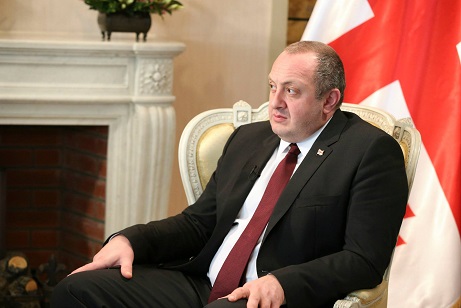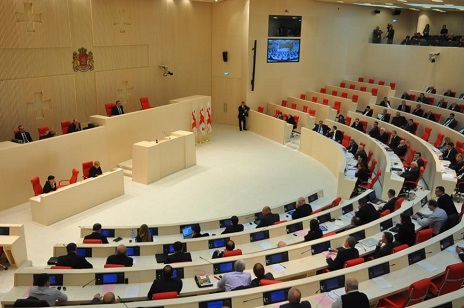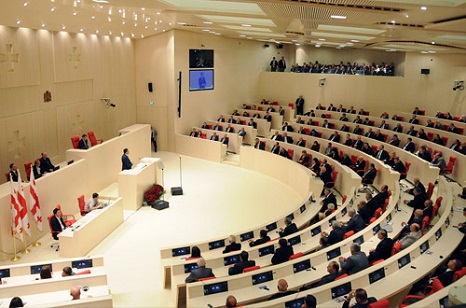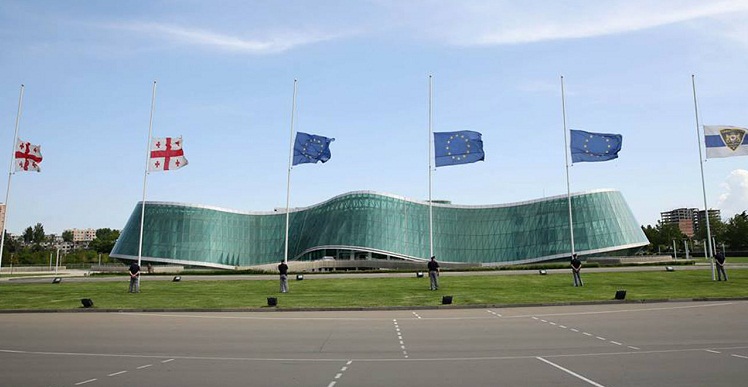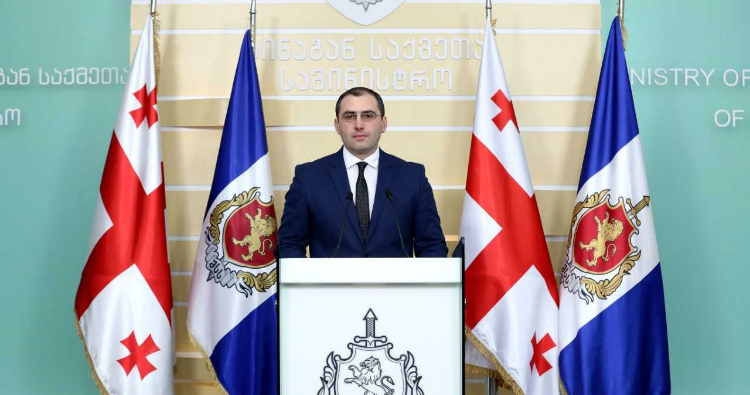UPDATED: Parliament finally approves surveillance bill

UPDATED 6pm: Final Approval
Parliament of Georgia has approved a Government-backed bill on surveillance that allows the Ministry of Internal Affairs (MIA) to retain ‘key’ access to surveillance at its third and final reading today after 73 Members of Parliament (MPs) voted in favour and 30 voted against.
The second and the third readings took place today, on November 28 – just one day after the initial reading was held. The bill will now be sent to President Giorgi Margvelashvili to be signed. The President must sign the draft bill before the December 1 deadline otherwise the bill will be void.
Opinions for and against
Parliament Speaker David Usupashvili refrained from voting in the bill’s third reading, which was initiated by majority MPs Eka Beselia, Gedevan Popkhadze and Irakli Sesiahsvili. Their proposal allowed the MIA and the Personal Data Protection Inspector to carry out surveillance after their submission was approved by the court.
Republicans and Free Democrats refused to participate in the second and third readings of the draft and said the document was hastily prepared.
Republican MP Tina Khidasheli stated the two parties supported the alternative draft pushed forward by Republic MP Vakhtang Khmaladze, which offered granting the ‘key’ access to surveillance to the Communication Regulatory Commission. However this draft bill failed to gain support in Parliament.
Usupashvili responded to the situation this afternoon and delivered a speech before the second reading as an ordinary member of the Republicans to dispel doubts and smooth controversy between the Republicans and the Georgian Dream coalition.
He said there was no possibility Republicans would separate from the coalition following today's outcome.
Usupashvili stressed that differing opinions about who should hold the ‘key’ was a sign of the country’s democratic advancement. He declared that he supported Khmaladze’s initiative as he believed it was more democratic.
"The concept – a powerful MIA means a strong state – is wrong. There is no direct way from a powerful police to a strong state. A powerful state means a strong citizen, strong institutions, strong laws, a strong business sector, a strong parliament, a strong government…” Usupashvili said.
He also emphasized the importance of complete system changes in the MIA and in the Chief Prosecutor’s Office.
He said the current Government inherited a very poor heritage from the previous government, including a politicised MIA and Prosecutor’s Office among them. He recognised that some misleading steps of the Office in regards to former officials’ cases, created awkward situations for the current Government with international allies.
"The situation in the current Interior Ministry stands far from those in developed countries. That is why I supported Khmaladze’s initiative. However, I believe that in the near future we will support such laws that will be based on human rights,” Usupashvili said, and stressed he would have supported the Beselia-Popkhadze-Sesiahsvili initiative only if the Government took his appeal into account.
"The initiative is as such: We should carry out systemic changes in the MIA, in the Prosecutor’s Office and in all the bodies which need it. We should transform the MIA and the Prosecutor’s Office into real democratic structures,” Usupashvili said.
"I need Parliament’s and full support [from all governmental structures] in this regard,” he said.
Earlier 16:13: First vote
Parliament of Georgia has approved a Government-backed bill on surveillance offered with 75 votes in favour and 58 against.
If the bill is approved after three readings, the Ministry of Internal Affairs (MIA) will keep ‘key’ access to surveillance. Three readings of the bill must take place and a decision to approve or reject the proposed bill must be made before December 1.
PM on draft law
Prime Minister Irakli Garibashvili assessed the outcome of yesterday’s first reading as "reasonable and of state importance”.
"It is surprising for me why the draft was so heavily opposed. I hope that speculations over the issue will be finished forever,” the Prime Minister said.
The draft suggested by majority Members of Parliament (MPs ) Eka Beselia, Gedevan Popkhadze and Irakli Sesiahsvili, which proposed the MIA and the Personal Data Protection Inspector were eligible to carry out surveillance only after a court order, was supported by many but opposed by opposition parties United National Movement ( UNM), Free Democrats and some MPs from the ruling coalition.
NGOs' opinion
Representatives from local non-governmental organisations (NGOs) also protested the draft when it was earlier discussed in Parliament. NGOs protested today and stressed that leaving the ‘key’ with the MIA would increase the chances of illegal surveillance, back to the level it was under the previous government. They hoped the President will veto the draft if it is finally accepted.
"Presumably we will demand the President’s veto on the bill. However we do not know the President’s position concerning the issue as we have not held consultations,” said head of the International Society for Fair Elections and Democracy (ISFED) Nino Lomjaria.
The President has already vetoed amendments to the bill on Electronic Communication as he did not agree with Parliament’s decision to extend the adoption of the bill from November to February.
Meanwhile, opposition MPs also spoke about the President’s possible veto and claimed the draft bill revealed the interests of the MIA.
"Surprisingly, all the wishes of the MIA are reflected in the draft,” said Free Democrats member Shalva Shavgulidze.
Earlier the Government strongly argued that the ‘key’ should be in the hands of the MIA and it should not be necessary to notify telecommunication operators before surveillance took place, as this would increase the risk of leaking sensitive information and undermining operative activities of law enforcement agencies.
However NGOs disagreed and said the ‘key’ should be given to the court and mobile operators. This initiative was criticised by the Prime Minister, who pointed out that mobile operators were often of foreign origin (eg, Bee line is Russian, Magticom –American, Geocell-Turkish) and giving the ‘key’ to such companies would pose a risk to state security. Therefore, the court that issued a surveillance order was against being offered the ‘key’ and additional obligations.
About a week ago two alternative draft bill options were presented in Parliament; the draft prepared by Beselia-Popkhadze-Sesiashvili and the other by Republican MP Vakhtang Khmaladze, which offered giving the ‘key’ to the Communication Regulatory Commission. However, the latter draft failed to gain enough votes.
Parliament is currently discussing the bill at its second reading today. Three readings are necessary for a bill to be approved. If the President vetoes the bill, at least 76 votes are required to override it.
Illegal surveillance and eavesdropping was widely used under the previous government. Hours of illegal footage obtained during the UNM administration was destroyed by the Georgian Dream coalition earlier this year.
 Tweet
Tweet  Share
Share

